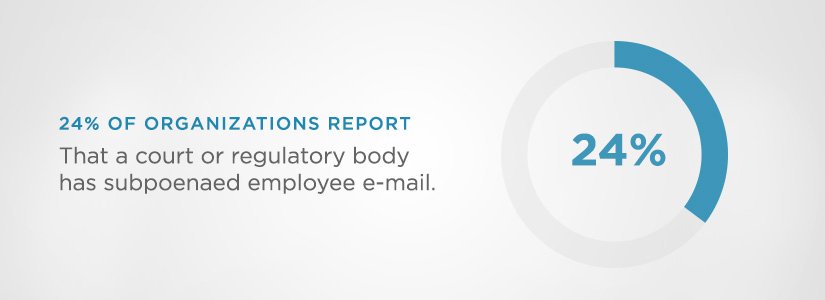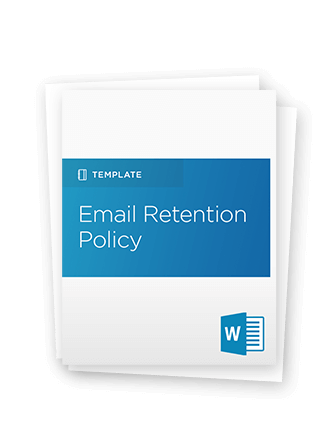How to Preserve Your Email In Case of Potential Lawsuits

While avoiding lawsuits is an important aspect of any businesses plan, having a plan you can put into motion should a lawsuit be filed is simply a must.
Many businesses faced with litigation find themselves ill prepared, or simply not prepared at all. A crucial area you can improve is email, as lawsuits often hinge on being able to provide accountability of these 21st century necessities.
But where does one begin in readying their email system for potential lawsuits?
Delete That Delete Button
When a lawsuit is filed, one of the first steps that plaintiffs need to take is legal discovery. This is where they gather information about the event in question, and are gathering proof they can use in court to prove their case.
While that may seem like something that would work against you, cooperation is not only legally required, but has just as much chance of showing that you did absolutely nothing wrong. Moreover, by maintaining full records of emails, you can help ensure that anything relevant to the case that the plaintiffs don’t request in their legal discovery, you’re able to bring forward for the case yourself.
For this reason, deleting emails is never a good thing. In the best-case scenario, you’re deleting something that you can use to help show you were in the right. In the worst case, you’re deleting something that could put you in violation of the court mandated discovery process, which can come with severe legal ramifications, including fines and potentially even jail time.
This is an issue that isn’t new, and as technology becomes more and more entwined in our day-to-day business and personal lives, email-related lawsuits will become even more and more prevalent, as they’re showing no signs of slowing down anytime soon.
Holding on to Items That are Likely to Result in Litigation
If you’ve ever been through a lawsuit before, you’ll know that often times the situation that comes into question is something you can see manifest itself right in the moment. Lawsuits rarely come as a total surprise, so when you experience something that makes you think a lawsuit may result, move the items into a litigation hold, or an area on your server that is specifically designed to maintain emails and documents that could come-up in court.
In some instances, law firms may force your hand on that matter, in fact. By issuing a ‘litigation hold’, a law firm can ask you to ensure you hold on to certain emails that may come-up in a lawsuit they’re considering filing. These litigation holds should be taken extremely seriously, as they almost always mean that a client has asked their lawyer to file an lawsuit against you and will require emails as part of the legal proceedings. The lawyer may find there is no reason to file, but it’s a good indication that one is, indeed, on its way down the pipeline.
While rare, a court can sometimes order a litigation hold as well. In these instances, it isn’t just a good idea to follow through with holding the emails in a safe and secure manner; you’re bound to by court order. While these situations can be handled in-house, it’s usually a good idea to utilize a reputable third-party archiving company to hold the documents for you.
These companies ensure that the original copy sent to them remains intact, with logs showing each time the file was accessed, by whom, and any changes that were made. Or, preferably, that no such activity was done, establishing your company as one that doesn’t need to hide anything at all, something that courts look at during the legal process.

Demonstrating Cooperation to the Courts
The last thing you or your company wants to do is appear to be uncooperative in litigation. You aren’t required to like being sued—there would probably be something wrong with you if you did enjoy it—but cooperating is something that works out in your favor.
Unlike the criminal court system, civil court doesn’t require the judge or jury to reach a determination “beyond a reasonable doubt.” Their measuring stick is much broader, often consisting of little more than “they probably did it.” As such, demonstrating that you have nothing to hide in the process, that you are ready and willing to defend yourself in court by cooperating with the process, shows the judge or jury that you’re an honest person or company.
With the lower proof standards, it is never more important than in civil cases to win the hearts and minds of the judge and jury, and going above and beyond in documenting and preserving any and all evidence connected to a case helps you demonstrate just that.
But is all this preservation worth it? Will helping to ensure cooperation with legal discovery eat away at your already tight work schedule?
Automation is Your Friend
As email gained popularity, it wasn’t uncommon for companies using email to print off physical copies of emails for controversial dealings to preserve evidence. This helped them archive the information as it allowed them to lock the documents away in a secure warehouse, ready to be subpoenaed during discovery at a moment’s notice.
The trouble with this system is that it often required an entire team dedicated to printing out the emails, transporting them, and involved considerable storage costs, not to mention the costs for all that printing. Even if a lawsuit was never filed, the company ended up losing as they forked out thousands before even being served.
Thankfully, technology has advanced. In this day and age, we have the ability to maintain secure records digitally, eliminating the need for expensive storage or pricey printing. What’s more, a system can securely store every email sent and received automatically, eliminating the possibility of records getting lost, or their validity being called into question.
By putting an automatic archiving system in place in your business, you’re putting yourself in a position where your workforce no longer has to worry about whether an email may need to be retrieved or not, as they’re archived without employees needing to take any action at all. This helps you relieve stress, and ensures that if a situation arises, you’re ready and able to cooperate to the fullest extent.
Outsourced Archiving Outsources the Headaches
Getting served with a lawsuit is stressful enough, but running around trying to make sure everything is in order adds even more unnecessary stress. By outsourcing archiving to a third-party, you’re able to breathe a sigh of relief, knowing that your records are secure, and that everything you need to show that you did everything right is ready and available as soon as it’s needed.
Whether it comes from legal discovery or a litigation hold, Intradyn offers systems designed to show your records are complete, intact, and unaltered. That can go a long way in the civil court system, and will be appreciated by judge and jury alike.
We’ve been in the email archiving business for 14 years. In that time, we’ve learned the ins-and-outs of how best to archive emails and files, ensuring everything is needed, able to be easily retrieved as necessary, and well documented. Our secure digital storage systems allow for emails to be archived following all legal recommendations, helping you ensure that if you get served with an email lawsuit, you’re prepared.
To find out how we can help you put a plan in place, contact us today and allow us to demonstrate how we can help you prepare yourself should litigation come your way.

